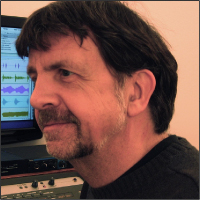Brian Young
// Songs Of The Spirit Founder & PresidentBRIAN YOUNG is Founder and President of Parallel Voice Productions, LLC, based in New York City. Brian and his producing partner, Jonathan Secor, direct and co-produce the interfaith and intercultural concert series, “Songs of the Spirit,” celebrating the musical and spiritual connections among diverse faiths and cultures. Featured artists have included Hugh Masekela, Odetta, Patti Smith, Salman Ahmad, Meshell Ndegeocello, Gary Lucas, Sekou Sundiata, Craig Harris, Haale, The Klezmatics, Ollabelle, Tracy Grammer, DJ Spooky, Sussan Deyhim, The Tibetan monks of the Drepung Loseling Monastery, and the Shangilia Youth Choir of Nairobi, Kenya. Brian’s career as a producer, artistic director, recording engineer, and sound designer (and musician/songwriter on the side) spans more than thirty years and includes projects and events with artists such as Ray Charles, Yoko Ono, Tito Puente, Vernon Reid, Bill Frisell, Joan Osborne, Richie Havens, Lucinda Williams, Kool Moe Dee, Judy Collins, Kenny Rogers, and Jerry Lee Lewis.
Website: www.songsofthespiritconcert.org
Interview:
I suppose the first challenge here is to define the word “spiritual”. If we agree that it refers to the realm of life that transcends the physical world and defies description by mere words, then music is a natural vehicle for spiritual expression. We can’t explain why music touches us and affects us in the ways that it does. So even the discussion about why music operates in a realm beyond words is, to a great degree, beyond words. We know that a melody alone can stir deep emotions, and that adding melody and rhythm to words can enhance and empower those words in ways that enable them to touch us more deeply than they otherwise might. When you further enhance that music with arrangement, orchestration, dynamics, and sonic textures, the effect can be even more dramatic. The visceral feel of deep bass, for example, brings the music directly into our bodies in ways that our ears alone do not perceive.
When discussing the relationship between music and spirituality, there are different types of experiences to be considered. There are listening experiences and expressive experiences, either of which can be communal or solitary. Any or all of these experiences may or may not be connected to that which we call “religious,” depending on the context of the experience. The difference between “religious” and “spiritual” is yet another discussion, which I’ll leave to the philosophers and scholars. Some music is directly associated with worship and religious ceremony, and some is not. Personally, I have found both to be equally moving, revelatory, and transcendent. I tend to view God in terms of the vast network of energy that connects everyone and everything in the universe; a concept that is found in both ancient religious and spiritual teachings and in modern science, particularly in quantum physics. Although the languages and missions of these disciplines differ greatly, many of their implications are surprisingly similar. Music works in both worlds; religious and secular, sacred and scientific. This makes perfect sense to me, because I feel that the only real barriers between such worlds are those which we have constructed intellectually.
With regard to the creative experience, many songwriters will tell you quite sincerely that they really don’t know where certain songs come from. This is an interesting observation about another aspect of music that remains so mysterious. I have written some songs that were deliberate, methodical efforts to convey a preconceived story line with a formulaic melody, while others just seemed to appear out of nowhere while I was fooling around at the piano, drifting off to sleep, or driving down the road. Sometimes, the term, “channeling,” seems like an appropriate description of the process. There is also the experience of jamming with other musicians, where the non-verbal communication and musical connections can feel almost telepathic. Even the experience of mixing live music, as a sound engineer, can feel transcendent when you are totally in the groove; feeling and anticipating the dynamics, changes, solos, and making just the right moves on the console at exactly the right moments. The magical part is that it can happen with music that you have never even heard before. All of these things allow us to reach, in varying degrees, into a realm beyond the palpable and temporal boundaries of the physical world.
With “Songs Of The Spirit,” the interfaith and intercultural concert series that Jonathan Secor and I direct and co-produce, we are focused on the communal listening experience. The goal here is to unite diverse audiences in a common experience through music that is inspired and informed by the shared spiritual ideals of diverse faiths and cultures. Regardless of their individual religious beliefs or spiritual practices, or the absence thereof, we want audiences to have a shared experience of mystery and awe when listening to the words of the great Sufi poets sung to a hypnotic, electric groove; share the joy and energy of an up-tempo Gospel choir backed by a loud, driving rhythm section; or be simultaneously moved to tears by the haunting melody of a minor key Cantorial piece or a melancholy violin. These are examples of the mysterious, unspoken connections that exist between all people, which music can illuminate in ways that defy definition or description.
“[My goal] is to unite diverse audiences in a common experience through music that is inspired and informed by the shared spiritual ideals of diverse faiths and cultures.”
– Brian Young, Songs Of The Spirit Founder and President


